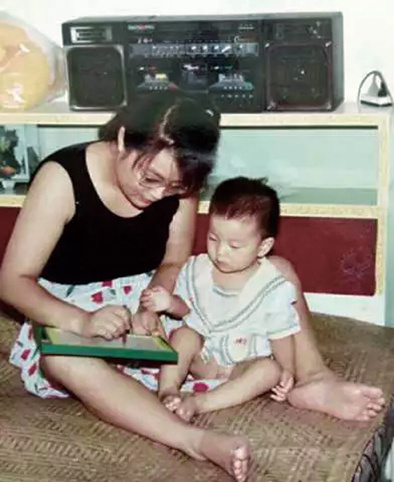
Photo of Zou and her son. (Photo/Xinhua)
A famous saying by English poet George Herbert goes "One good mother is worth a hundred schoolmasters."
In the case of Ding Zheng, who was born with cerebral palsy in China's Hubei Province and is studying law at Harvard University, his mother Zou Hongyan is worth a thousand schoolmasters and more.
SAVING HER SON FROM DEATH AT THE COST OF DIVORCE
"There is little value in rescuing the baby. He will become mentally disabled or paralyzed. I suggest you give up," a doctor at Jingzhou District Hospital told Zou and her family on July 21, 1988.
Zou was shocked.
"We shall give up the baby. He will make our whole life miserable," her husband said. His "rational" words hurt Zou deeply.
On the fourth day after giving birth, Zou managed to go to the intensive care unit where her baby was, only to find him especially "quiet," neither crying nor even frowning after a nurse gave him injections of medicine.
The 25-year-old mother had suffered enough to give birth to the child. She had been carried home several times by her students after fainting during her pregnancy while teaching; she had forced herself out of the habit of sleeping late, and into one of reading poems for antenatal training in the early mornings; she had walked a long way to the market to buy fresh vegetables to provide better nutrition for the child in her womb, and she had forced herself to eat even while suffering from severe morning sickness.
But her child was in a life-threatening situation after suffering intrauterine hypoxia due to the medical negligence in Jingzhou City of Hubei Province on July 18, 1988, leaving her with the choices of either taking the baby off life support or keeping him on it, but probably ending up living a difficult life taking care of the physically-handicapped or even paralyzed boy.
"No! I shall not let my boy die! I felt so happy when his little feet gently kicked my abdomen, and his heart beat together with mine, like dancing a ballroom dance," Zou said.
"You are just too stubborn to listen to the doctor's advice. You will be the one to take care of the baby," said Zou's husband.
Yet Zou did not change her mind and started the long journey of rehabilitation training for Ding. Zou divorced her husband when Ding turned 10 due to their differences over whether to raise Ding.
SHOULDERING THE FAMILY'S BURDEN
"Of all the disabilities, I was most afraid that Ding Zheng would be mentally disabled," Zou recalled.
She started to take Ding to Hubei Provincial Hospital of Traditional Chinese Medicine to check his intelligence when he was less than 100 days old.
With continuous treatment, the day finally came when the doctor said Ding's intelligence level was normal after the boy turned one year of age.
"Nothing was more soothing than the news that my precious boy has normal intelligence," Zou told Xinhua.
However, due to damaged motor neurons in the cerebellum, Ding had great difficulties in sports: He could not hold things until the age of one; he learnt to stand at the age of two, walk at three and jump at six. Zou instilled perseverance into her son and never let him give up.
Ding needed massage treatment three times a week, costing five yuan (about 0.7 U.S. dollars) for each session. But Zou's salary as a teacher was just over 100 yuan (about 14.5 dollars) in the 1990s. There was no insurance covering Ding's rehabilitation.
The family was packed together into a room of less than 20 square meters. Whenever there was rain, basins and buckets were put on the bed to collect the rain drops.
In order to make a living and treat Ding's illness, Zou did many part-time jobs, including selling insurance after work for five years.
"I started to treat Ding Zheng when he was under one year old and was suffering from severe cerebral palsy. It was because his mother paid special attention to his illness, took him to our hospital for treatment at a very early age and continued his treatment non-stop for over ten years that he could recover to such a great extent. Early and continuous treatment for cerebral palsy patients is crucial," said 75-year-old Xiao Daiqi, who was a doctor at the department of pediatrics in Hubei Provincial Hospital of Traditional Chinese Medicine.
"Many hypoxic brain damage patients have low intelligence. I think, in Ding Zheng's case, his mother's unwavering support for early and continuous treatment for him played a key role in his recovery," the doctor told Xinhua.


















































